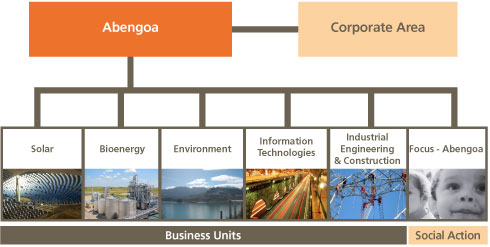 Abengoa
Abengoa
Annual Report 2009
- Activity Report
- Abengoa and Innovation
- Abengoa’s Commitment to Innovation
Abengoa’s Commitment to Innovation
Abengoa is a technology company whose five Business Units create innovative solutions for sustainable development in industries concerned with infrastructure, the environment and energy.

The global community is now in the process of mitigating and reversing humanity’s past mistakes. We have overused the world’s natural resources and treated the environment as a dumping-ground for industrial emissions and waste.
The economist Jeremy Rifkin has said that what is now sometimes called the “black” economy (opposed to the “green”) – the industrial revolution driven by oil, cars and centralized energy production – peaked in the late twentieth century. Attempts to preserve the status quo only led to distortions, like the financial and property bubble that has recently burst. So it is now time to undertake a third industrial revolution: the Green Revolution.
Global warming is caused by human activity. We have raised the atmospheric concentration of CO2 year after year: In September 2009, the Keeling curve exhibited a CO2 concentration of 385 ppm. This poses a serious risk to the environment and to our way of life. It is also set to deal a harsh blow to the world economy. According to the Stern Review on the Economics of Climate Change, global warming could throw the world into a slump involving a 20 % decline in global GDP (Gross Domestic Product). This means the economy and society would be severely disrupted for the remainder of this century and beyond.
The Stern Review estimates that an investment of 1 % of world GDP is needed to allay the effects of climate change. So far, however, decision-making processes have largely disregarded industry’s harmful “externalities”. Environmental and social considerations are thus rarely a factor in prevailing economic practice. But by this stage the only remaining question is how quickly we can get to a zero-emissions economy.
Against this backdrop of far-reaching change, Abengoa is determined to become a world benchmark in the development of innovative technological solutions for sustainable development. We hope to become a global leader of the Green Economy. The concept of “Green Economy” was coined in the midst of the present world economic crisis as part of the Global Green New Deal, the United Nations environment program mooted on October 22, 2008 to address the interdependence between economic activity and natural ecosystems, more specifically, industry’s harmful implications for climate change and global warming.
President Obama used the term “Green Economy” in his speech to the United States Congress on February 25, 2009 in connection with his ambitious program of energy reform. The new scheme, popularly known as “cap and trade”, aims to lower greenhouse gas emissions by 80 % by 2050 and to create millions of new, “green” jobs.
Over the next ten years the United States will spend $150,000 M to promote second-generation biofuels (lignocellulosic bioethanol), support the electric and hybrid car market, encourage the commercial development of renewable energies and start the changeover to a new digital power grid.
And, in Spain, the Council of Ministers set its seal on the draft of a new Sustainable Economy Bill on November 27, 2009. Regarded as the centerpiece of the current legislative term, the new law is intended to bring about much-needed change in the Spanish economy by opening it up to innovation and renewal.
Abengoa, for its part, has worked on the challenge posed by sustainability for the past twenty years. It has honed its capacity for technological innovation as the right tool for this paradigm shift. Abengoa has invested in research, development and innovation, recruited and developed the necessary talent, and disseminated the most promising technologies on a global scale. These new production processes call for a demanding schedule of investment, and that investment has served as Abengoa’s engine in creating a new generation of jobs and a new array of benefits for the wider community.